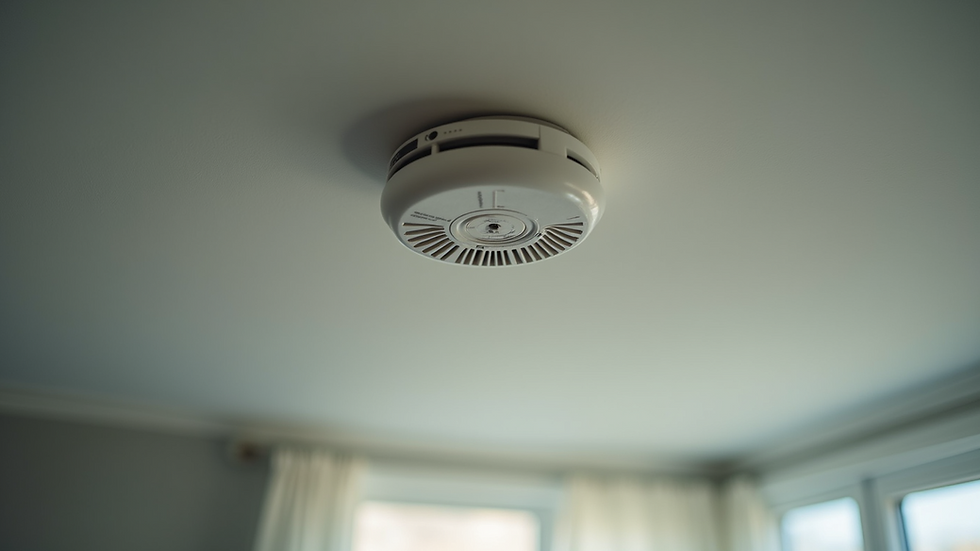Essential Smoke Alarm Rules Every Homeowner in NSW Should Know
- daniel mccloskey
- Jul 15
- 4 min read
Fire safety is a top concern for every homeowner. Understanding smoke alarm rules is essential to keeping your home and your loved ones safe. In New South Wales (NSW), smoke alarm regulations are clear and specific. This blog post outlines the key smoke alarm rules that every homeowner in NSW should know. Being informed not only aids in compliance but also enhances safety.
Importance of Smoke Alarms
Smoke alarms are lifesavers. They alert occupants to smoke or fire, giving everyone a crucial chance to escape unharmed. According to the NSW Government, having a working smoke alarm can boost the chances of escape by up to 50%. This fact alone underscores the importance of understanding smoke alarm regulations.
With approximately 1,300 house fires reported in NSW each year, knowing these rules is not just helpful—it is vital.
Types of Smoke Alarms
There are two main types of smoke alarms used in NSW:
Ionisation Smoke Alarms: These alarms are best at detecting fast-flaming fires, commonly caused by flammable liquids and materials. They respond quickly to flames but may take longer to detect smoldering fires.
Photoelectric Smoke Alarms: These alarms are more effective for detecting smoldering fires, often indicative of fires caused by overheating fabrics or electrical appliances. For this reason, they are recommended for use in bedrooms and sleeping areas.
Many homeowners choose to install both types to provide comprehensive coverage. Following 2020 data, homes with both alarms are less likely to experience fatalities from house fires.
Where to Install Smoke Alarms
Placement of smoke alarms is crucial for their effectiveness. Here’s where you should install them:
On every level of your home: Including basements and attics ensures broader coverage.
In every bedroom: Having alarms near sleeping areas is essential. Data shows that most fire-related fatalities occur during nighttime while people sleep.
In hallways: Position alarms in hallways that connect bedrooms to provide a clear warning path.
For tailored advice on the best locations for your smoke alarms, consult with a local electrician in the Central Coast area.
Battery vs. Hard-Wired Smoke Alarms
Homeowners in NSW can choose between two main types of smoke alarms:
Battery-Operated Alarms: These alarms require regular battery changes. It’s a good practice to check and replace the batteries at least twice a year.
Hard-Wired Alarms: These connect directly to your home’s electrical system. They reduce the risk of malfunction due to dead batteries, but you still need to test them monthly.
Consider your home's electrical setup and your personal needs when selecting your smoke alarm. For more information, consider consulting a licensed electrician in Central Coast.
Maintenance and Testing
Regular maintenance is key to ensuring smoke alarms work correctly. Here are essential tips:
Monthly Testing: Test your smoke alarms once a month by pressing the test button. If you hear no sound, replace the batteries or the entire unit if necessary.
Cleaning: Dust can impact performance. Gently vacuum the alarm using a soft brush or wipe it down with a cloth.
Replacement: Smoke alarms should be replaced every 10 years. Check the manufacturer's date on the back of the unit.
Implementing these strategies will help ensure that your smoke alarms are primed for action when needed.
Compliance with NSW Legislation
NSW smoke alarm regulations require homeowners to follow specific guidelines:
Stand-alone houses: Must have at least one working smoke alarm on each level and one in the hallway.
Residential units: Must have a smoke alarm in each apartment, preferably placed near bedrooms.
Annual compliance check: Homeowners need to perform a fire safety compliance check once a year.
Non-compliance can lead to penalties. To ensure your alarms meet current regulations, consult a knowledgeable local electrician.
When Selling a Property
If you are selling your home, ensuring that your smoke alarms comply with legal standards is crucial. The NSW Government mandates a smoke alarm compliance certificate for properties listed for sale or rent. This certificate confirms that your smoke alarms meet safety standards.
To ensure your alarms are compliant, a residential electrician in Central Coast can evaluate their condition and placement.
Common Myths About Smoke Alarms
There are several myths regarding smoke alarms, and knowing the facts is essential:
Myth: Smoke alarms only need to be installed on ceilings.
- Fact: Smoke alarms can also be installed on walls, as long as they are at least 300mm from the ceiling.
Myth: Hard-wired smoke alarms don’t require testing.
- Fact: Hard-wired alarms still need monthly testing and must be replaced every 10 years.
Understanding these myths can improve your fire safety awareness and keep your family safe.

Staying Informed and Prepared
Being aware of essential smoke alarm rules is a key part of preserving safety in your home. Knowing the regulations, types of alarms, proper installation, and maintenance procedures will help you take the right steps to protect your family and property.
If you have questions or need assistance with your smoke alarms, reach out to a local electrician in Central Coast or Wamberal who specializes in installation and repairs. Staying proactive about fire safety can make a difference when every second counts.






Comments